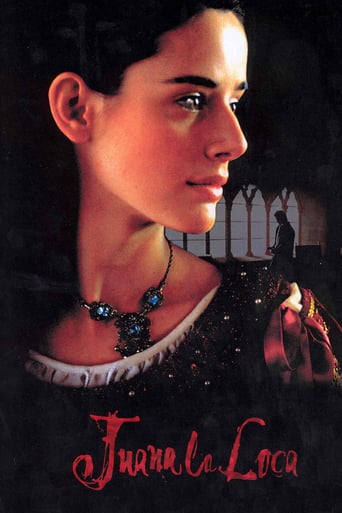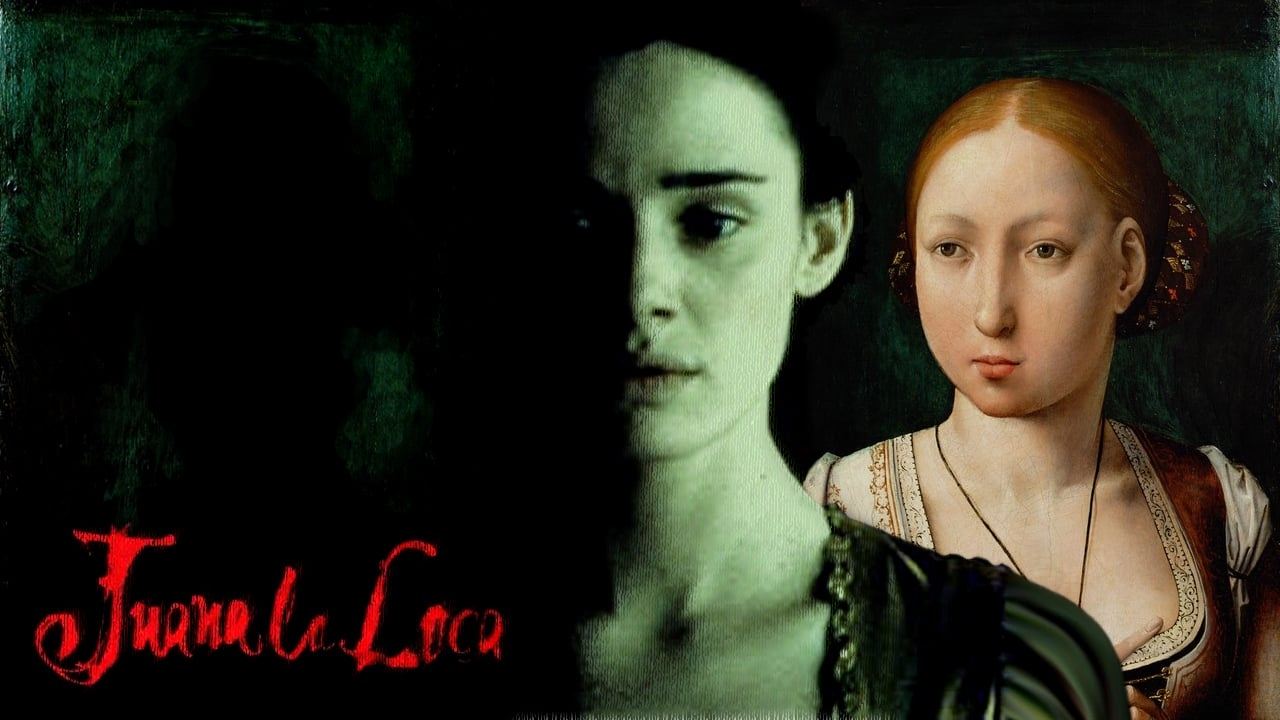JLRMovieReviews
Another historical movie? But, this may be one you haven't heard of.It concerns Juana, daughter of Isabel, Queen of Castille, who is arranged to be married to Philippe of Flanders. The story, though told in flashback, captures you with its intensity of feelings. Ironically, she had an infatuation with a boy her age already (but beneath her station,) whom she had to leave behind. He reciprocated the feelings, but nothing had ever happened.Once she sees her future husband, she falls in love, as they instantly go to consummate their soon-to-be wedding. She finds out soon after their wedding, though, that he is a womanizer. She tries to hold on to her man throughout the whole film, and it is a struggle. Rather than rely on facts (perhaps their relationship had no important highlights), the movie delves into their lust and make this a very emotional and passionate experience. I did like it very much, as I prefer emotional, moody pieces to distant studies of people. But at some point it feels like "Sex, Lies, and Videotape," as they are in and out of bed constantly.On the whole, if you get a chance to see it, you'll be glad you did. But, be prepared to see more of their sheets than actual facts.
monimm18
I liked this film, but I think it could have been better. There were three things that, in my opinion, weakened its impact. The first thing was the presence of a narrator. I happen to believe that using a narrator in a film with characters and dialogue, although sometimes justifiable, is many times a sign of script or directing weakness; usually, if both the screenplay and the director are good enough, conveying all the information should be possible (and would be more powerful) without a narrator explaining what's going on.The second thing that bothered me was the acting. I found it impossible to connect with the characters, however poignant I found their story (OK, Liotti's looks grabbed my attention quite a bit, but I wouldn't chuck that up to talent...). I felt that de Ayala's acting lacked a certain depth and had a narrow range (most of it consisted of numerous infantile fits of rage in between scenes where she eagerly spread her legs). Liotti seemed lifeless, although I was told his voice was dubbed in Spanish, which usually lowers the power of a performance quite a bit (apparently, he originally delivered a lot of his dialogue in Italian).The third thing that bothered me was the film's (director's?) incapacity of explaining the roots and justification of Juana's mad love for Phillip. Yes, I know it was a powerful combination of lust and emotional dependency, that Juana was a passionate woman and apparently Phillip was quite a fiery lover, but I never felt the characters' passion.The film focused too little on Juana's personality/character and the way the chemistry between her and Phillip developed. I realized how powerful her passion for him was, but it was only thanks to the dialogue, not to the acting, neither to the filming style (does anyone else think the film needed more close-ups, mostly during highly emotional scenes?). In my opinion, the film scratches the surface emotionally and artistically, but fails to go deep.Having said all that, let me assure you that, overall I think it's still a film worth seeing, although definitely not for historical accuracy. The story, loosely based on the Spanish queen Juana de Castilla's life, is quite moving, maybe more for those who have experienced the kind of passion that Juana had for Phillip. A woman so passionately in love with her man, so consumed by her love and so anguished by his philandering and growing lack of reciprocity to her love that she becomes obsessed with possesing him and forgets she is a queen and that her first duty is to her people. I was just sorry to see such a passionate love story idea being presented in a bit of a lethargic manner.
millerbd-1
While this is not a film for the fainthearted, its explicit passion isn't gratuitous. And while the fair-minded viewer will find much to recommend it, "__Juana la loca__" (English title "Mad Love") is probably (and understandably) best appreciated by those who know the history, culture and language inspiring it. Two of the film's strongest features are its artfully ambivalent treatment of Juana's insanity (contributing to a debate that has fascinated people for over four hundred years), and its raising of all kinds of feminist questions. Into the bargain "__Juana la loca__" is gorgeously filmed, and well acted, especially considering themes and situations essential to the story that might seem like pure melodrama if less well executed. There are segments that could seem excessive in another context; but this is a story about excesses. Intelligent, thoughtful audience members will find much in the film worth pondering.
Keith F. Hatcher
Based on the stage play `La Locura de Amor' (Teatro del Principe, Madrid, January 12th 1855) by the dramatist Manuel Tamayo y Baus (1829-1898), Vicente Aranda's film `Juana la Loca' ran into several problems even before it appeared in public. The Italian co-producers changed certain parts of the film for the Italian premier, and Aranda had to threaten them with law suits. However, the version we see here in Spain is the original as Aranda conceived it. The story centres around Juana, eldest daughter of Isabel de Castilla and Fernando de Aragón, historically known as `Los Reyes Católicos', whose youngest sister, Catalina (Catherine of Aragón) was to end up headless following her marriage to Henry VIII, king of England, and mother of Carlos who was to be Carlos I of Spain and V of Germany. As was the habit in those days, her future marriage was arranged so as to unify the odd kingdoms lying around medieval Europe, the same as her progenitors had already done whilst tackling such enterprises as getting that Genovese sailor to hop off across the Atlantic and discover new worlds. Her chosen spouse was Phillipe, crown prince of Flandes and Normandy, otherwise known as `Felipe el Hermoso' (Philip the beautiful), as Spain already had control of most `vlaemink' territory, roughly known as Flandes, today being part of the Netherlands. Unfortunately the future Queen Juana lost her head by falling so hopelessly in love with this goodly hunk of man (played here rather insipidly by Daniele Liotti), that she went crazy as he was always off on such masculine adventures in the arms of other women. Thus the plot is set for this film. Sumptuously costumed, the film takes us to historical castle and palaces in Sigüenza, Talamanca de Jarama, what I think is the Monastery of `Las Huelgas' in Burgos, and Guimaraes in Portugal, among other carefully chosen spots. What else is carefully chosen remains to be seen. Pilar López de Ayala carries out a very worthy rendering throughout her lengthy and complex reading of the part, the only weak or at best doubtful parts being precisely when she is with her beloved dashing prince: melodramatic moments verging on histrionics. Otherwise her performance is very recommendable, even giving the slightest of hints as to the stage-play origins of this work at times. The rest of the cast is reasonable enough without anyone attracting too much attention, whether on purpose so as to keep the leading actress clearly up front in the limelight, might be debatable. Whatever, Liotti most definitely was not up to the mark: his playing was somewhat insipid, lacklustre, without feeling. Was the real historical character also left-handed?Vicente Aranda has never reached me as one of our great directors: if `Tiempo de Silencio' (1986) (qv) is his best film, followed by `La Pasión Turca' (1994), in neither case I found the film totally satisfying in terms of doing justice to the novels on which they are based - by Luis Martín-Santos and Antonio Gala, respectively -, and others of his films like `Celos' or the `Capitán Sánchez' TV series, just simply left me unimpressed.Added to that, José Nieto, one of Spain's most accomplished film and television composers, seemed to be rather uninspired for `Juana la Loca'. And that is strange, as I would have thought that this kind of film was right up his street. However, as it turns out, his contribution was interspersed with what sounded very much like the Burgos school of organists, such as Antonio de Cabezón, frequent but very hazy suggestions of `La Folia Española', and what I at first identified as something from the Valencian Court musicians and which had me worrying, until the end credits put my unease at rest naming Luys de Milán, important 16th century composer.
Even with the Turkish Belly Dancer thrown in for good measure, this film was missing most of its potential. Perhaps when they do the re-make they will invite Isabel Coixet to do it. Then I might well be the first in the queue at the box-office.


 AD
AD


